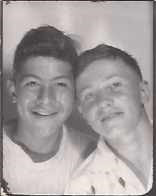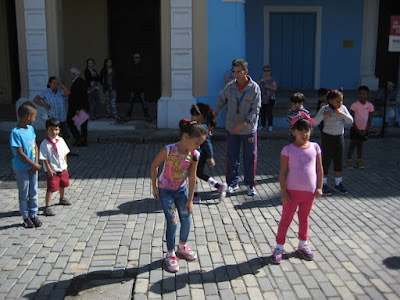Four-year-olds are a lot more intuitive, introspective, and understanding than most adults give them credit for. That includes a lot of well-meaning parents who don’t want to rush their toddlers into the ‘real world’ too soon. The fact is, children as young as three and four may not understand the emotions of anger, fear, pain, and loneliness but they do feel them nevertheless.
What parents might consider ‘adult emotions’ are felt just as strongly and deeply by toddlers as their older siblings. While they may not be able to verbalize those feelings, they are present and should be recognized for what they are; real emotions. Waleed, my skinny hippo, seems to have struck a chord of understanding with that age group. Now a four-year-old and a Ph.D. have lent validation to that fact.
This summer, I had the
opportunity to talk to Dr. Sharon Bergan, professor of early childhood
education at Dakota County Technical College. She had been introduced to my
children’s series, ‘Waleed, the Skinny Hippo’, and loved the storylines in both
books.
During our conversation, Dr. Bergen educated me on the subtle nuances that adults often misread or misunderstand about their children. It turns out that toddlers ‘get it’ a lot more often than we give them credit for. Kids are often a lot more insightful than they might seem on the surface.
I got validation of that theory
first hand from a friend of mine. His first grandchild, Sophia, is a real fan
of both my ‘Waleed’ children’s books. After her initial introduction to the
skinny hippo, Waleed became the ‘go to’ book whenever Sophia came to visit
grandma and grandpa.
This validation by Sophia was particularly gratifying because I had felt when I began writing the series that I wanted the little insecure hippo to tackle adult feelings and emotions that are usually not addressed in most children’s books.
That particular deep-seated
prejudice on my part stemmed from the way I was treated as a child growing up.
The adults around me, most of them staunch rural German Catholics, saw children
as labor around the farm, chore boys, and household help. These purveyors of the
old way of doing things saw no value in young minds until they’d been indoctrinated
by the church, school and authorities. ‘Dick and Jane visit the farm’ was not
the approach I was going to take in telling my story of this skinny insecure
hippo.
Book one was a rather simple
story of a hippopotamus that wasn’t like all the other hippos. Waleed was
skinny and feeling very unsure of himself because of his slender physique instead
of the robust form of the other hippos. Gradually, the story evolved into a
children’s moral tale or fable with a wise old fish, indifferent fellow hippos
and one sad little guy.
Book Two took the same kind of projection.
It covered the theme of ‘facing one’s fears.’ Both ‘being different’ and
‘facing one’s fears’ were emotions I felt at a very young age but never had an
adult who could explain them to me. Meeting with Dr. Bergen was very helpful in
terms of my understanding the child’s mind at that early stage in life.
Dr. Bergen reminded me that
Waleed like Sophia only think of themselves at this stage in their development.
First me, then others. So, my goal in telling both stories was to educate
Waleed but also to think of others. Dr. Bergen encouraged me not be afraid to
use big words. She said it would not intimidate children like Sophia.
The most interesting part of
our conversation were her suggestions for future themes in the Waleed series. I’ve
outlined in very rough form some of the thoughts Dr. Bergen shared with me that
day.
Sadness
Events where a child might feel
sadness include a grandparent passing, a pet is lost or dies, divorce, moving
away and leaving friends, can’t have that toy. In these instances of a child
feeling sadness, the response from a parents should be: It’s okay. I get it.
Happiness will return but perhaps not right now. This event might tell
the child how important that thing/item/person/event is to them in their lives.
Anger
Teaching about anger can lead
to social justice. Parent tell child that it is okay to be angry. They can say:
Use your words to express your feelings. Get them out. Understand what it is
(person, incident, event) that makes you feel this way. Now, what can we do
with that energy (of being angry.)
Connections
It can be hard if you want to
join a group or make a new friend. Ask an adult to help make those connections.
Be brave. The way to make connections
might be to help others, join a group. It can be scary but you must keep
trying. It is okay to take a chance, take a risk that someone will not be nice
to you in return or may not want you to join the group. But you MUST keep
trying to make connections. Take a chance even with the fear of failure.
Failure
Everyone feels the fear of
failure. Failure is a part of life. It is better to have tried and failed than
to never have tried in the first place. No one will ever ‘not fail.’ Anything
worth doing, pursuing, trying to achieve is worth the chance of failing at
attempting it. Failure is NOT the issue. How one handles failure is the more
important thing to know and understand.
When I’m ready to begin a third
book in the Waleed series, I think my theme will be ‘being kind.’ There’s a
plethora of examples that should lend themselves to some very colorful visual
images.
- Being
kind
- Helping
others
- Thinking
of others
- Lending
a helping hand
- Caring
for someone else
- Being
aware of other’s feelings
- Being
supportive in their time of need.
My goal, as always, will be to
help the young reader identify with my Waleed character much like readers
identified with characters in the Harry Potter series and creatures created by
Dr. Seuss. I’ll be trying to find more Sophia’s out there to discover my
favorite little hippo.











No comments:
Post a Comment